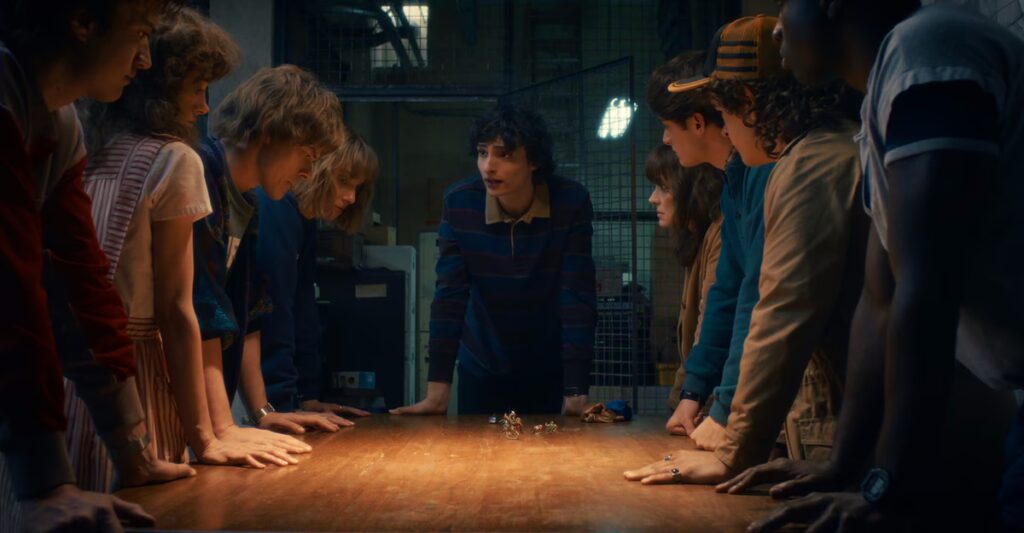In a recent article for The Atlantic, W. David Marx argued that culture as we know it today is a hoarder’s paradise, a hopelessly cluttered landscape of rubbish. “Everyday life has never contained more stuff—an endless reel of words, ideas, games, songs, videos, memes, outrageous statements, celebrity meltdowns, life hacks, extremely talented animals,” he writes. My 5-year-old’s favorite song is a version of “Golden,” the standout hit from Netflix’s KPop Demon Hunters, meowed by fake cats. Her favorite TV show is Is It Cake?, a Netflix baking competition seemingly inspired by a viral TikTok trend that involved making trompe l’oeil cakes disguised as random objects. Everything in popular culture feels recycled or reanimated or patched together out of preexisting elements. The dominant art form of the 21st century is the remix.
Stranger Things got there first. When the show debuted nine years ago, at the tail end of Barack Obama’s presidency, what was most astonishing about it was how unabashedly it pillaged the Blockbuster Video archives, borrowing from Spielberg and Hughes and Cameron to produce a pop-cultural behemoth that managed to both gratify audience nostalgia and create fresh intellectual property. Matt and Ross Duffer, its genial creators, were able to sell Stranger Things as a sincere homage, a love letter to 1980s media born out of admiration, not a cynical cash grab in an era of supercuts and sequels. Thanks to them, even in its fifth and final season, the series still has a pure heart. In the background, though, are product-placement deals featuring more than 100 carefully selected brands, a curated Spotify “experience”, influencer tie-ins, and prime Demogorgon placement inside the new Netflix House at the King of Prussia mall, in Pennsylvania—the latter truly a potent postmodern symbol of art becoming consumption. “Who wouldn’t want an $80 cookie house modeled after Vecna’s death mansion?” Fast Company’s Jeff Beer wondered recently about the show’s branded partnership with Williams Sonoma.
[Read: Stranger Things isn’t TV. It’s something else.]
It would be hard for any show to carry the weight of all this late-capitalist ambition, and the series’s last season embodies all the best and worst aspects of the Stranger Things decade. (The first four episodes were made available for review, and are streaming today.) It’s been almost three and a half years since Season 4, during which time the once-tweenage actors have hit drinking age (or, in Millie Bobby Brown’s case, become a parent); the teenagers have entered their 30s; and David Harbour’s beard has reached Rip Van Winkle proportions. I struggled to remember the specific plot nuances from a time before Sabrina Carpenter’s adult-pop era, but the story doesn’t really require thoughtful comprehension. At the end of Season 4, Vecna (Jamie Campbell Bower)—the antagonist who possessed and murdered victims after manipulating their minds—was revealed to be the ruler of the Upside Down, the parallel dimension Will Byers (Noah Schnapp) was transported to after being kidnapped in the first season. Once a sadistic child with telekinetic abilities named Henry Creel, Vecna was experimented on in the same government lab as the show’s heroine, Eleven (Brown); this allowed him to control the gruesome creatures of the Upside Down in service of a larger plan, and to create a rupture between the two dimensions.
Season 5 jumps forward in time 18 months to November 1987. Hawkins, Indiana, is under military quarantine, surrounded by metal fencing. Robin (Maya Hawke) and Steve (Joe Keery) are broadcasting a radio show that periodically roasts the occupying forces and delivers coded messages to the core characters—Chief Hopper, Joyce, Eleven, Nancy, Mike, Will, Dustin, Lucas—who occasionally try to infiltrate the Upside Down to conduct sweeps in search of Vecna. Winona Ryder’s Joyce and David Harbour’s Hopper are still technically together, albeit with apparently minimal interest on the part of the writers. Eleven is wanted by the military and so mostly spends her time doing drills with Hopper, whose overprotectiveness as a parent is matched only by Joyce’s constant fretting over Will.
[Read: Stranger Things won’t save Netflix]
When everyone is a fan favorite, no one is expendable, which is why the cast has sprawled out to such an unmanageable extent. There’s no time for characterization—not when Mike has to purchase a Coke from an ostentatiously branded vending machine, or a group breakfast has to be written in to showcase Mrs. Butterworth’s pancake syrup and Sunny Delight. The first episode is largely devoted to catching viewers up; everything that comes after follows the formulaic grooves of previous seasons—propulsive set pieces, meme-able moments, heavy allusions to a pop-cultural touchstone that will likely be important (in previous seasons, the show has nodded directly to Wes Craven and Stephen King; this time, the crucial text is Madeleine L’Engle’s A Wrinkle in Time). The violence seems brutal for a series so heavily invested in childhood; the characters barely get to relate to one another; the capers are slapdash and illogical; and for some reason Murray, the grating conspiracy theorist, seems to get more screen time than Eleven, the ostensible star of the show.
All of this might change in the episodes still to come. (Not the violence—the Duffers have acknowledged that the final season features one of the most gruesome deaths yet.) I found the first four episodes largely joyless and grim, right up until a moment that seemed to reset the show, or at least to capture some of the connection and spirit that used to make it so compelling. At its best, Stranger Things has been a show about the triumph of underdogs, outcasts, and aliens—not an original concept, sure, but a winning one even now, as the government posts propagandistic imagery celebrating white heritage and children are snatched not by fictional monsters but by masked officers. If Stranger Things can locate more of that humanity in its last few episodes, it’ll be much easier to swallow everything else it’s trying to sell us.
The post ‘Stranger Things’ Comes to an Exhausting End appeared first on The Atlantic.




